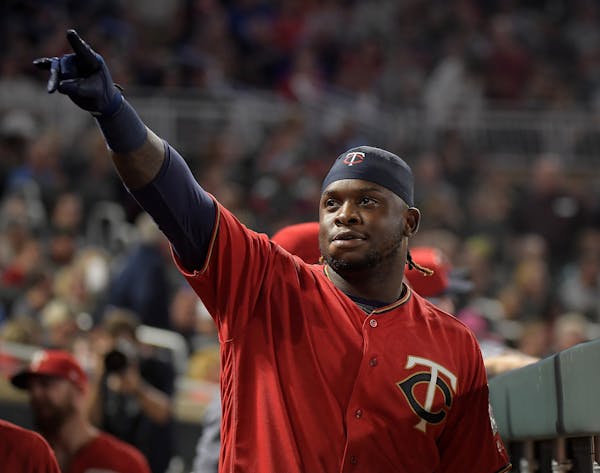Brian Dozier played like a franchise cornerstone this season. As he should. He's a durable veteran who hit 42 home runs last year and has always performed well at second base.
Joe Mauer returned to being a quality offensive player. Which is what he should be. He continues to lack power but his on-base percentage and fielding made him an important part of a winning team.
Ervin Santana led the rotation. Jason Castro and Chris Gimenez performed well defensively. Byron Buxton finally began fulfilling his potential.
These things all should have been expected.
What proved unexpected and fueled the Twins' late-season charge to a playoff berth, making them the first team to lose 100 games one year and qualify for the postseason the next, was the midseason rise of three pivotal but underrated players.
In a different era, they might have been called the Three Amigos, even though none are from Mexico and they hail from three different countries. There is no nickname that adequately groups them today, unless "essential" can be worked into a sobriquet.
Eddie Rosario. Jorge Polanco. Eduardo Escobar. To do what the Twins did this season, they needed a few key players to outperform expectations. All three have.
When scouts and publications pegged Buxton and Miguel Sano as future stars, they often left Rosario on a second tier. Smallish and lacking a history of plate discipline or power hitting, Rosario looked like he may become one of those players who can contribute to but cannot carry a team.
He has blown up that impression this season. He has handled the pressure and responsibility of batting in the middle of the order on a playoff team. He has produced by far the best slugging percentage and on-base-plus-slugging percentage of his career while playing deftly and throwing with precision in left field.
Rosario has proved he can hit 25 or more home runs in a season. Even if a Superball-style baseball is contributing to power numbers across baseball, Rosario has established that he is far from a slap or gap hitter. He may now be viewed as a cornerstone player.
The first time I watched Polanco in a game was in 2014, at Class A Fort Myers. The Twins had begun an internal debate over whether he would be a shortstop, second baseman or utility player. That debate continued through the middle of this season.
Entering this year, the Twins thought he might be a good-hitting, average-fielding shortstop. He upended both expectations. On Aug. 1, he was batting .213 and recovering from the death of his beloved grandfather. Since then, he is hitting .323 with a superstar-caliber .945 OPS while batting in the middle of the order. Like Rosario, he has raised the possibility that he could be a star, not merely a placeholder for Nick Gordon.
Considering he might be the nicest person in the Twins organization, Escobar is a remarkable contrarian. When the Twins have handed him a starting job in spring training, he has failed. When they have not handed him a starting job, he has earned one during the season.
Sano might have been the Twins' most valuable player before he injured himself in mid-August. Escobar took over third base and hit .261 with an .839 OPS. Those numbers don't compare to Sano's production when he was at his best, but before his injury Sano was hitting .267 with an .843 OPS in August. Escobar has ably replaced what Sano had been giving the Twins in the second half.
The Twins will enter the postseason with a batting order that begins with their trusted veterans, Dozier and Mauer, and then segues into a middle of the order combination that would have been considered improbable and inadvisable as recently as a month ago.
Polanco. Rosario. Escobar. The placeholder, the contributor and the utility player have become middle-of-the-order thumpers unafraid of carrying a flawed team. They, as much as any Twins, have made the playoffs possible.

Souhan: Why Tiger Woods should keep swinging
Souhan: Scheffler wins Masters again, shows what makes him special
Morikawa falters in final round at Masters

Keeping up with the Joneses who helped design Augusta National's classic back nine


